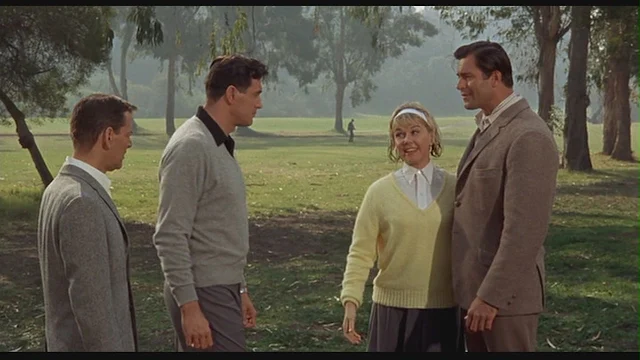Lover Come Back (Delbert Mann, 1961)
 |
| Doris Day, Rock Hudson, and Tony Randall in Lover Come Back |
Jerry Webster: Rock Hudson
Carol Templeton: Doris Day
Peter Ramsey: Tony Randall
Rebel Davis: Edie Adams
J. Paxton Miller: Jack Oakie
Linus Tyler: Jack Kruschen
Millie: Ann B. Davis
Director: Delbert Mann
Screenplay: Stanley Shapiro, Paul Henning
Cinematography: Arthur E. Arling
Art direction: Robert Clatworthy, Alexander Golitzen
Film editing: Marjorie Fowler
Music: Frank De Vol
Send Me No Flowers (Norman Jewison, 1964)
 |
| Tony Randall, Rock Hudson, Doris Day, and Clint Walker in Send Me No Flowers |
George: Rock Hudson
Judy: Doris Day
Arnold: Tony Randall
Mr. Akins: Paul Lynde
Winston Burr: Hal March
Dr. Morrissey: Edward Andrews
Bert: Clint Walker
Director: Norman Jewison
Screenplay: Julius J. Epstein
Based on a play by Norman Barasch, Carroll Moore
Cinematography: Daniel L. Fapp
Art direction: Robert Clatworthy, Alexander Golitzen
Music: Frank De Vol
The gag "I knew Doris Day before she was a virgin" has been attributed to various wags, including Groucho Marx and Oscar Levant, but in fact the canard that the Rock Hudson-Doris Day comedies were all about Day defending her virginity stems mainly from the second of the three films,
Lover Come Back. In the first,
Pillow Talk (Michael Gordon, 1959), Day's character seems perfectly willing to go off for a weekend with Hudson's, and in the third,
Send Me No Flowers, they're already married. Still, these are sex comedies, and Day's characters are, if not virgins, at least naïve.
Pillow Talk remains the best of the trio, if only because its initial teaming of the perky Day with the handsome Hudson feels inspired -- as if its makers had been watching the great screwball comedies of the past and had looked around for contemporary equivalents to Jean Arthur, Rosalind Russell, Katharine Hepburn, Claudette Colbert, and Carole Lombard on the one hand, and Cary Grant, Gary Cooper, Henry Fonda, James Stewart, and Joel McCrea on the other. If Day and Hudson don't seem quite as distinguished as that company, I think that's because the movie industry had changed so much in the interim, with stars no longer seen as members of a studio's repertory troupe. To my mind, Day and Hudson hold their own nicely. What had also changed was a certain coarsening of the treatment of sex as the Production Code began to crumble -- there's a sense that writers and directors in the heyday of screwball comedy were content to finesse the limitations of the Code while those of the early 1960s were thumbing their noses at it. Certainly there's nothing so crass in the great comedies of the 1930s and '40s as the scene in
Lover Come Back in which Day's Carol Templeton orders a designer to remodel the container of a potential client's product, saying that whoever gets the contract will have "the most attractive can." Cut to a closeup of the bunny-tail-adorned bottom of Edie Adams as the nightclub dancer Rebel Davis. There's also a lot of humor in these movies that feels sadly dated in ways that the classic '30s and '40s comedies don't, especially the play on symbols of the Confederacy when Hudson's Jerry is trying to woo a Southern client: Rebel exposes an array of Confederate battle flags across her chest as the band plays "Dixie."
Send Me No Flowers feels a little less crass than either
Pillow Talk or
Lover Come Back, partly because we have moved from sex comedy to domestic comedy of the sort more familiar from TV sitcoms: Hudson's George is a hypochondriac who mistakenly thinks he's dying and wants to provide for Day's somewhat ditzy and impractical Judy. If the toned and brawny Hudson seems like a misfit in this part, we have to accept it as a given -- just as we have to accept the goofiness of Cary Grant as a paleontologist in
Bringing Up Baby (Howard Hawks, 1938). Perhaps one reason the producers cast the impossibly tall and bulked-up Clint Walker as Judy's old boyfriend was to make Hudson look comparatively normal.




